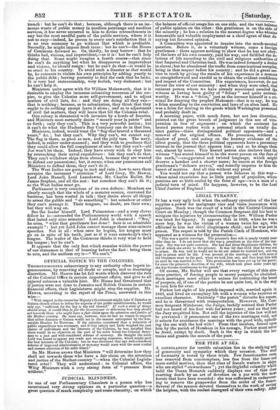JUDICIAL BLINDNESS.
IN one of our Parliamentary Chambers is a person who has entertained very strong opinions on a particular question—a great question of much complexity and some obscurity, on which the balance of official usage lies on one side, and the vast balance of public opinion on the other : this gentleman is on the side of the minority ; he has a relation in the nearest degree who obtains honourable and valuable employment as a chief agent of that de. caying but favoured opinion. A Committee was appointed to inquire into the much-mooted question. Before it, as a voluntary witness, came a foreign gentleman : there appears nothing to show that he has not obey- ed the laws of his own country, paid his way, and fulfilled the re- lations of life according to the civil and religious authorities of that Imperial and Christian land. He was indeed formerly a dealer in slaves ; but he abandoned the traffic from conscientious scruples, being in that respect before his country ; and he did a great see. vice to truth by giving the results of his experience in a manner so straightforward and candid as to obtain the evident confidence and respect of the Committee. His experiences, however, do not favour the view of our minority : and when they were cited, that eminent person whom we have already mentioned assailed the witness as having been guilty of "felony" and quite untrust- worthy. He was a "felon," just as the accuser himself is a cri- minal for denying the prophet Mahomet—that is to say, he was a felon according to the conviction and laws of an alien land. He was a felon for dealing in the goods which Washington possessed and probably dealt in.
A morning paper, with much force, but not less discretion, pointed out the gross breach of judgment in this use of vitu- peration in lieu of argument : on which the eminent but heated person replies with a personal attack on totally dis- tinct parties—three distinguished political opponents—and renewal of the original offence. He presumes, without a shadow of proof, and acting on the hearsay evidence of the idlest gossip, that the three political opponents have a pecuniary interest in the journal that opposes him ; and so he drags them out, almost by name. This bleated person also declares that the witness "has stated himself to be the worst person on the face of the earth,"—exaggerated and twisted language, which might deserve a harsher and a shorter name; he sneers at the foreign gentleman's "delicate nerves," and roundly imputes to him the basest of motives. And all this without any proof.
You would not say that a person who behaves in this way— whose mind experience has so little purged of prejudice, whose passions are so little cooled by the frost of age—was a man of a judicial turn of mind. He happens, however, to be the Lord Chief Justice of England !


























 Previous page
Previous page